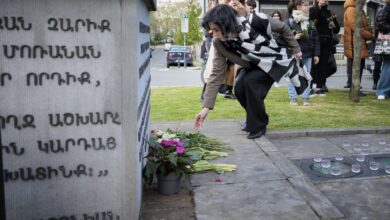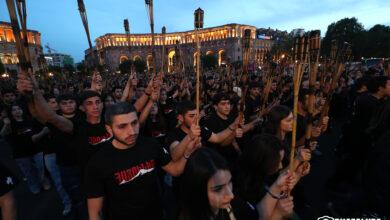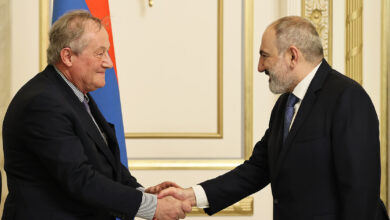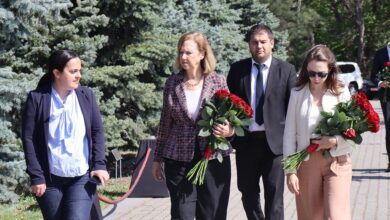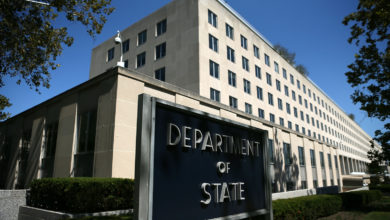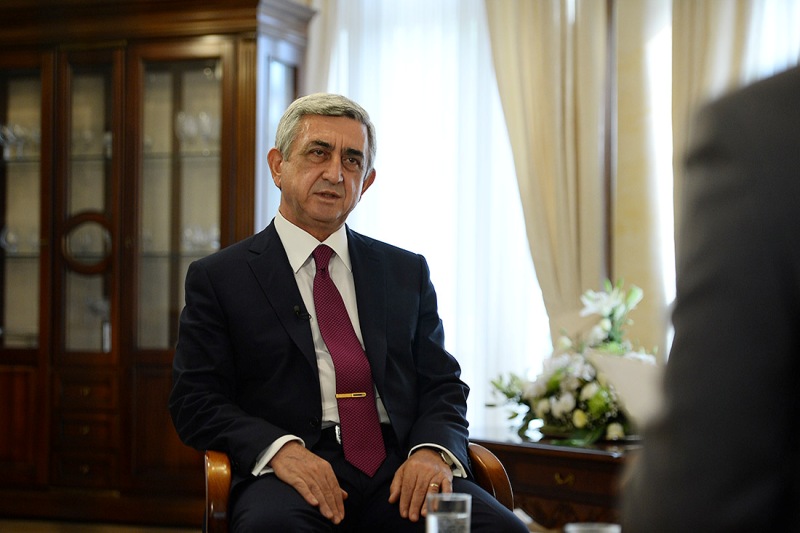
In an interview with the New York Times Armenian President Serzh Sargsyan discussed the dynamic and vibrant young nation he leads, its history, economy and international relations. As Armenia asserts itself on the international stage and seeks to continue its development, the president explains his country’s identity and outlines the wide range of opportunities that this investor-friendly nation presents to the wider world
How would you appraise the relationship between Armenia and the United States?
Relations with the USA comprise an important part of our foreign policy agenda on both bilateral and multilateral dimensions. Historical close interactions as well as the common ideas of independence, democracy and freedom have contributed greatly to the deepening and widening of the relations between the two nations. We have reached a qualitatively new level
of partnership with the USA thanks to joint efforts. The continuous assistance provided to Armenia and Artsakh has played and continues to play an essential role in the democratization of the two Armenian republics. Our interests coincide with those of the United States in a variety of spheres: the establishment and enforcement of regional security and stability and, within this context, the peaceful settlement of the Nagorno-Karabakh conflict; the democratization of our country; the liberalization of the economy and the rule of law. From this perspective we attach great importance to the open government partnership (OGP) initiative in cooperation with the US that Armenia is actively engaged in.
At the same time, within the framework of the “Millennium Challenges,” the United States has made a substantial contribution to the regional development of our country through the implementation of a number of regional infrastructure projects. We attach great importance to the activity of the US-Armenia Task Force, to the growing American presence in the Armenian economy and to the close cooperation with the USA in the energy sector, for example the support we have received from the US to extend the life of the operating reactor of Metsamor nuclear power plant. This is also important from the perspective of balanced regional development. We firmly believe that the trade and investment framework agreement (TIFA) signed between Armenia and the United States will boost economic ties. Another essential achievement is the launch of the visa liberalization process.
The United States is our largest donor state. Since Armenia’s independence, the United States has provided about US$2 billion of humanitarian and technical assistance. Our two nations also cooperate to fight challenges to global security, such as terrorism and the proliferation of weapons of mass destruction.
What issues does Armenia face today?
Armenia has been illegally blockaded by Turkey for decades. Our other neighbor, Azerbaijan, demonstrates a hostile attitude toward Armenia and the Nagorno-Karabakh Republic. For a long period of time we have been living in “a no war, no peace” situation.
Armenophobia, militant rhetoric and armed provocations along the border have become an inseparable part of our daily life for 20 years. Today, the fragile peace in Nagorno-Karabakh is the lynchpin of peace in our entire region, and we defend the very peace of the region from the trespasses of our neighbor dictatorship, which is blinded by petrodollars. In my opinion, our number one priority has been and will remain the security of the Republic of Armenia and the Nagorno-Karabakh Republic.
Fragile peace is better than victorious war. The maintenance of peace is our greatest achievement, and in the upcoming years we will continue to prioritize security along with economic development, the promotion of democracy, education and health.
We seek a peaceful settlement to the Nagorno-Karabakh conflict based on international law, particularly on the arrangements achieved within the framework of the format of OSCE Minsk Group co-chairs. To this end we continue our active cooperation with the co-chair countries – the USA, Russia and France.
I regret to say that so far we have not achieved tangible results because of the maximalist and often provocative stance of Azerbaijan at odds with both the spirit of the entire process and our joint efforts with the international community.
What role can the Armenian-American diaspora play in the country’s development?
In the 21st century, public diplomacy plays a major role in the development of bilateral relations. In this regard, Armenians worldwide, many of whom are descendants of survivors of the Armenian genocide, are an inalienable and important component of Armenian public diplomacy. A vivid example thereof is the Armenian community in the US. Indeed, the current level of Armenian-American relations is also conditioned by this factor.
At the same time, this community contributes to the development and prosperity of both the USA and Armenia. The Armenian-American community regularly makes its voice heard in issues of pan-Armenian importance, such as the peaceful settlement of the Nagorno-Karabakh conflict, the recognition and condemnation of the Armenian genocide and the lifting of blockades.
What support do you expect from the US in the settlement of the Nagorno-Karabakh conflict?
As an OSCE Minsk Group co-chair, the US has exerted consistent efforts toward the peaceful resolution of the Nagorno-Karabakh conflict and the strengthening of stability in our region. Unfortunately, the efforts made in the past 20 years by the international community toward the peaceful resolution of the conflict are being undermined, endangering the peace and stability in the region due to the constant provocations and ceasefire violations by Azerbaijan.
I have announced on many occasions that there is no alternative to the negotiated settlement of the conflict. A proof to this is the constant willingness of Armenia to maintain dialogue in the framework of the formats proposed by the OSCE Minsk Group co-chair states, as opposed to Azerbaijan. In this regard we attach great importance to its continuous engagement and balanced position on the issue, based upon the principles of international law and in line with the co-chair statements.
Despite the fact that each conflict is unique in its historical, legal and political context, recent dynamics of international conflict resolution prove that fundamental human rights and freedoms, including free expression of will and self-determination of peoples, are a priority. In the words of former US President Woodrow Wilson: “National aspirations must be respected; people may now be dominated and governed only by their own consent.
‘Self-determination’ is not a mere phrase; it is an imperative principle of action.”
It is no coincidence that fundamental elements of the right to self-determination are rooted in the formation and development of the American nation. Today, we see that the right to self-determination is the civilized and legal solution to current ethno-political conflicts.
2015 marks the 100th anniversary of the Armenian genocide. What would you like the US public to understand about the event?
Even today, mankind still witnesses similar horrific crimes. History will continue to repeat itself until the crimes of the past have been unambiguously evaluated. Today, as a nation that survived genocide, we feel obliged to a certain extent, since we carry a unique mission to ensure no further recurrence of genocides. To this end, we seek the recognition and condemnation of past crimes.
We believe that the whole of mankind should be consistent in the recognition, condemnation and exclusion of denialism of this crime of crimes. This is our message to the international community, including the government and society of the United States, on the eve of the centenary of the Armenian genocide.
The Armenian genocide is an indisputable fact, documented by the international community when it provided refuge to the hundreds of thousands of Armenians that fled the massacres carried out by the Ottoman Empire.
Today, even educated circles of Turkish society have reconciled with their own past, opposing the official denialist position of their state. As human rights and fundamental freedoms have become of absolute value for the international community, subordinating the recognition of the Armenian genocide to political interests contradicts the moral and legal norms of the current world order. The strength of the US is also conditioned by its commitment to these absolute values.
The US legislative body has adopted eight decisions recognizing the Armenian genocide. It has been officially recognized in 40 US States. In the 1980s, the Reagan administration recognized and condemned the Armenian genocide. Sooner or later, Turkey will have to come to terms with its own past and free itself by restoring justice.
How can Armenia act as a bridge between the West and Russia as well as the CIS countries?
Since its independence, Armenia’s foreign policy has been balanced between the different systems and interests of the powerful stakeholders of the region, as opposed to drawing divisive lines. While it is a member of the CSTO (Collective Security Treaty Organization), Armenia has simultaneously developed enhanced cooperation with NATO and participates in peacekeeping missions which contribute to international peace and security.
Our country has developed and continues to develop strategic allied relations with the Russian Federation at the same time as consistently promoting a European agenda. Today we remain committed to that principle. Armenia has made a decision to join the Eurasian Economic Union (EEU) taking into account our national, economic and geopolitical interests. However, as I have stated in my speeches and interviews on several occasions, this has not been done at the expense of our relations with the West.
This is expressed through our active efforts to consistently advance our relations with separate European countries and the EU as a whole, as well as with the west in general; these relations form some of the essential components of our country’s prosperity. The Armenia-EU joint declaration from November 2013 reaffirmed our mutual commitment to develop and strengthen comprehensive cooperation.
We have agreed upon and applied visa facilitation mechanisms that are among the tangible outcomes of our partnership. We are committed to continuing our efforts toward seeking effective cooperation mechanisms with the EU.
Thanks to EU and Western assistance, our country has carried out important reforms in the spheres of democracy, human rights, rule of law and liberalization of the economy. We clearly realize that these reforms are not aimed at integration in this or that institution. First of all, these reforms are carried out for the benefit of our country and our people. I am sure that our Western partners share this view and will continue their efficient support to the democratic reforms in our country.
At the same time I cannot but mention that in the 21st century, when intense globalization is in progress, when the world is moving toward the establishment of common economic zones, when interstate economic borders lose their importance, when free trade areas are established among different continents, to speak about confrontation between different integration structures makes no sense.
Through joining the EEU, Armenia will be able to become an important link for the business communities of the EEU and Western countries. In this context, we are concerned by the recent tensions between the West and Russia.
We are interested in the reconciliation of discrepancies between our partners because small countries like Armenia are very sensitive to such ups and downs.
What is your government doing to challenge misperceptions about the country and the region in general?
We have always presented the challenges to our country and to the region to different organizations and at bilateral formats. The international community itself has witnessed how the adventurism of Azerbaijan has resulted in violence in the region, marking the deadliest period in the conflict since the ceasefire took effect.
Everyone witnessed the “Twitter diplomacy” of Azerbaijan’s president. Years-long continuous threats at the highest level were transformed into real actions, when civilian objects – kindergartens, schools, hospitals, as well as the peaceful population– were under fire. Where I see a misunderstanding by the international community is in the equality accorded to both the aggressor and the victim of aggression.
For more than 20 years, Armenia has warned about the military intentions of Azerbaijan, without proper response. This is either a misunderstanding or indifference. We have constantly presented the objective situation of our region to the international community; the rest is up to the international community.
What gives you confidence about your country’s future?
Independence itself was a significant event in the history of our nation. Today, Armenians all over the world are provided with an opportunity to build an independent Armenia on part of its historical homeland – a centuries-old dream for our people. Today, Armenia is a country developing according to the rules of the civilized world through effective state building, an open society and a competitive economy.
Mindful of this, I am really confident about the future of my country and this confidence first of all stems from our wonderful young generation. A new generation of Armenian citizens has grown which is even more patriotic than my generation was and with more educational opportunities. Along with being real devotees to their country, they have been brought up as world citizens.
For the last four to five years, approximately 100 young Armenians have graduated every year from the world’s top ten universities. We will therefore pass on our modern and secure country to safe hands and I am confident that they will make it much more prosperous.


